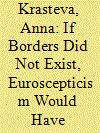|
|
|
Sort Order |
|
|
|
Items / Page
|
|
|
|
|
|
|
| Srl | Item |
| 1 |
ID:
172514


|
|
|
|
|
| Summary/Abstract |
The thesis of this article is that if borders did not exist, Euroscepticism would have invented them. If Sartre is paraphrased, it is to emphasize that Euroscepticism needs borders in the same intense political and symbolic way as anti-Semitism needs Jews. This thesis is argued in three steps. The first analyses the paradox of the intense theoretical deconstruction of borders in the era of an overbordered world and argues the ideas of the ‘revenge of the state’ and of the emergence of the ‘neo-post-Westphalian order’. The second part examines the post-communist Europeanisation as de-bordering and distinguishes three forms: Europeanisation through utopianization, Europeanisation through ethnic de-bordering and Europeanisation through de-territorialization. The third part analyses the interferences and intensification of re-bordering and Euroscepticism. The stato-national and the ethno-identitarian bordering practices are analysed through the images of wall and body. Two types of Euroscepticism – extremist and crypto – are distinguished and compared.
|
|
|
|
|
|
|
|
|
|
|
|
|
|
|
|
| 2 |
ID:
142485


|
|
|
|
|
| Summary/Abstract |
The article theorizes the vibrating relations between religion, politics, and nationalism in the Bulgarian postcommunist public sphere. “Secularization without secularism” was the formula of the communist politicization of religion. The postcommunist religionization of politics and politicization of religion are analyzed through the symbolic mapping of religions, the structural affinities between nationalism and Orthodox Christianity, the contestatory desecularization, the secularized Othering, and the desecularized identity. The author forges the notion of “elastic (post)secularism” in order to conceptualize the eclectic, diverse, and often contrary forms of the postcommunist politicization of the religious, which, in some cases, stretch it by way of a kaleidoscopic set of narratives and arguments toward secularism and, in others, toward postsecularization. Unlike Kristen Ghodsee's symphonic secularism, which regards the relation between religion and politics from the point of view of religion, elastic (post)secularism considers it from the point of view of politics.
|
|
|
|
|
|
|
|
|
|
|
|
|
|
|
|
|
|
|
|
|